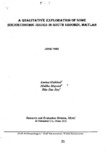| dc.identifier.citation | Mahbub, A., Mayeed, M., & Roy, R. D. (1995, June). A qualitative exploration of some socioeconomic issues in south uddomdi, Matlab. Research Reports (1995): Economic Studies, Vol - X, 21–123. | en_US |
| dc.description.abstract | The qualitative study tested the feasibility of utilizing the participatory rural appraisal (PRA) to understand the baseline situation and the mechanism of change. The purpose of this study was to exploring the baseline situation regarding socioeconomic issues such as income, occupation, wealth category, kinship, power structure. Education, cohesiveness, poverty situation and coping in crisis in South Uddomdi village of Matlab. Apart from this basic objective the study also looked to: identify indigenous indicators of socioeconomic situation and poverty situation, investigate people's perception about changes in the community and mechanism of changes over time regarding the above issues and to seek out - areas for future research.
The study was a repeated cross sectional one that took note of the situation prevailing at the current moment by using PRA methods. Matlab was specifically selected for the to learn about the socioeconomic impact of both BRAC and ICDDR,B interventions.
The study reveals that the villagers have their own perception about economic stratification. According to them, stratification is mainly dependent on the regularity of income. So, in other words~ the job a man does for living and the degree of dignity assigned to it by the community determines his status. Most of the villagers are farmers who also do other miscellaneous jobs according to the season. Those who also do salaried job in addition to farming are the wealthiest ones. The day laborers or fisher men are normally looked down upon because they earn less.
Bari or group of household is the base of social stratification. Status is depended on the prestige of a king group of a Bari. Traditionally prestige is constructed on educational attainment, solvency, manner and the role of that Bari in power practice. The villagers are experiencing that economic solvency and honor is mostly dependent on education; so they want their children to be educated, particularly the boys. Girl’s education is still not regarded as important.
There are some traditional institutions in South Uddomdi that reflects the cohesiveness of the village; the mosques, as such which were built decades ago by the villagers and are still being maintained through the villager's joint contribution. Nowadays, there are youth clubs, cooperatives and other social institutions. External institutions like BRAC also works as an agent of change.
The poverty situation of the villager's is influenced by the lean and pick agricultural periods, as the area is predominantly an agricultural one. The wealthy class is least affected by this because they have a continual flow of money generated multiple sources. The villagers identified Ashwin, Kartik, Falgun and Chaitra as the months of greatest poverty. The amount of work availability during this these seasons is very limited.
The villagers shared some common crises. The biggest crisis is 'No job no food' followed by the dowry payment and the consequences'. But these are not the only crises. The villagers described how they take loans, sell property and seek help from neighbors, relatives and patrons to cope with the crises. A preferential order was also found about their crisis moment network depending on type of different crisis. To overcome a big crisis, most of the time the villagers were found to take loan with exorbitant rate of interest from the professional money lenders. The villagers want to pay back their loan as early as possible. So they sell their harvested crops, reduce the numbers of meals taken, sell their valuables or take out another loan. But very often they are found too destitute and broken to repay the loan. They even migrate to another village if they fail to repay loan.
Poverty situation also influences the food intake of the vulnerable group; both the number of meals taken and the type of food taken are affected in the lean periods. Intra household food distribution discrepancies are far more common in rich households than in poor households.
The villagers identified some major changes that have taken place in the village over the last two decades. They are: the introduction of IRRI dhaan cultivation, growing interest in education, practice of dowry as an integral part of marriage. Changing role in power practice, the increase in the use of fancy commodities in the recent years, emergence of a vulnerable class and the participation of women in income generating activities.
The study also identified village organization (VO) and community level change of the VO members. But since the VOs in the village were then new, no mentionable change was observed. This attempt was taken just on a trial basis. As this study has provided very detailed qualitative baseline information supplementary to the quantitative one, it is hoped that a repeated cross sectional study on the same issues will help to identify the strategies that will be effective in bringing about socioeconomic change in the village.
All the names in this text have been changed; but the words tell the real story• | |

